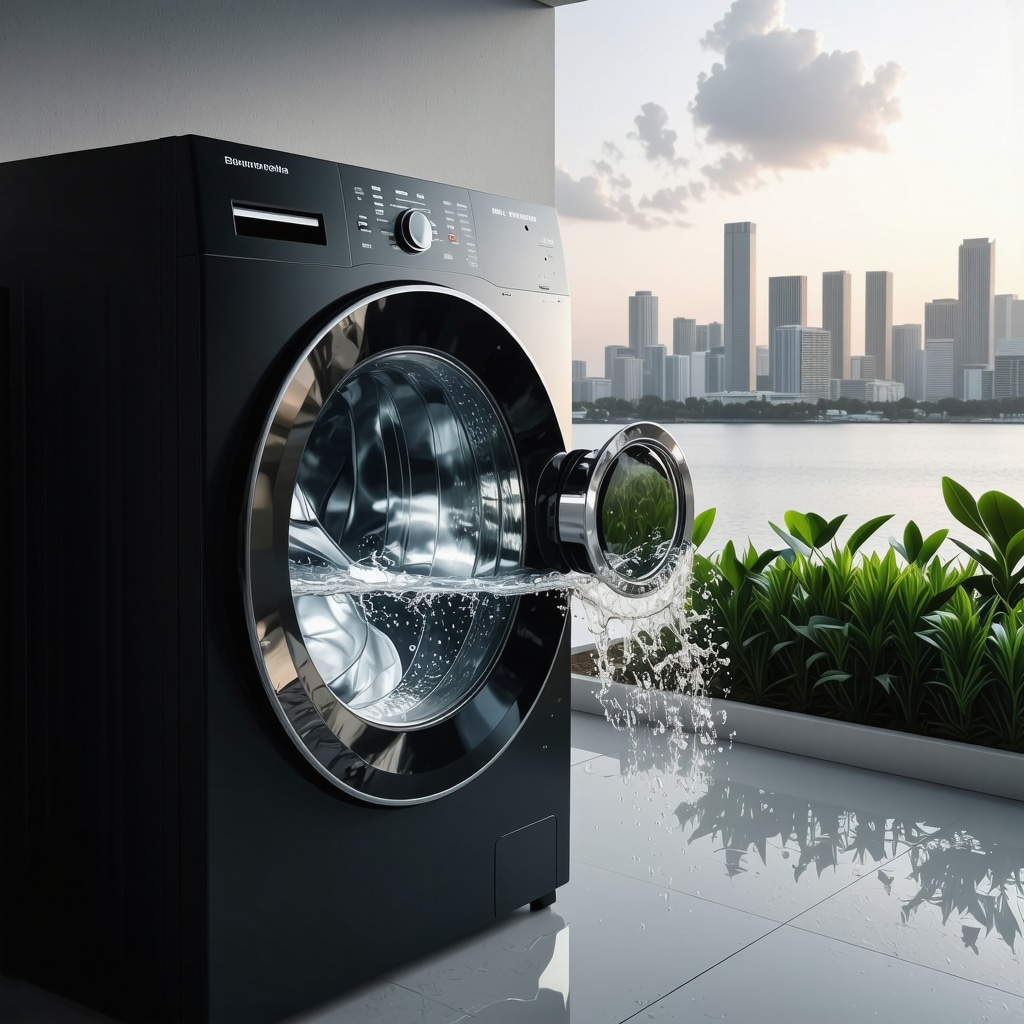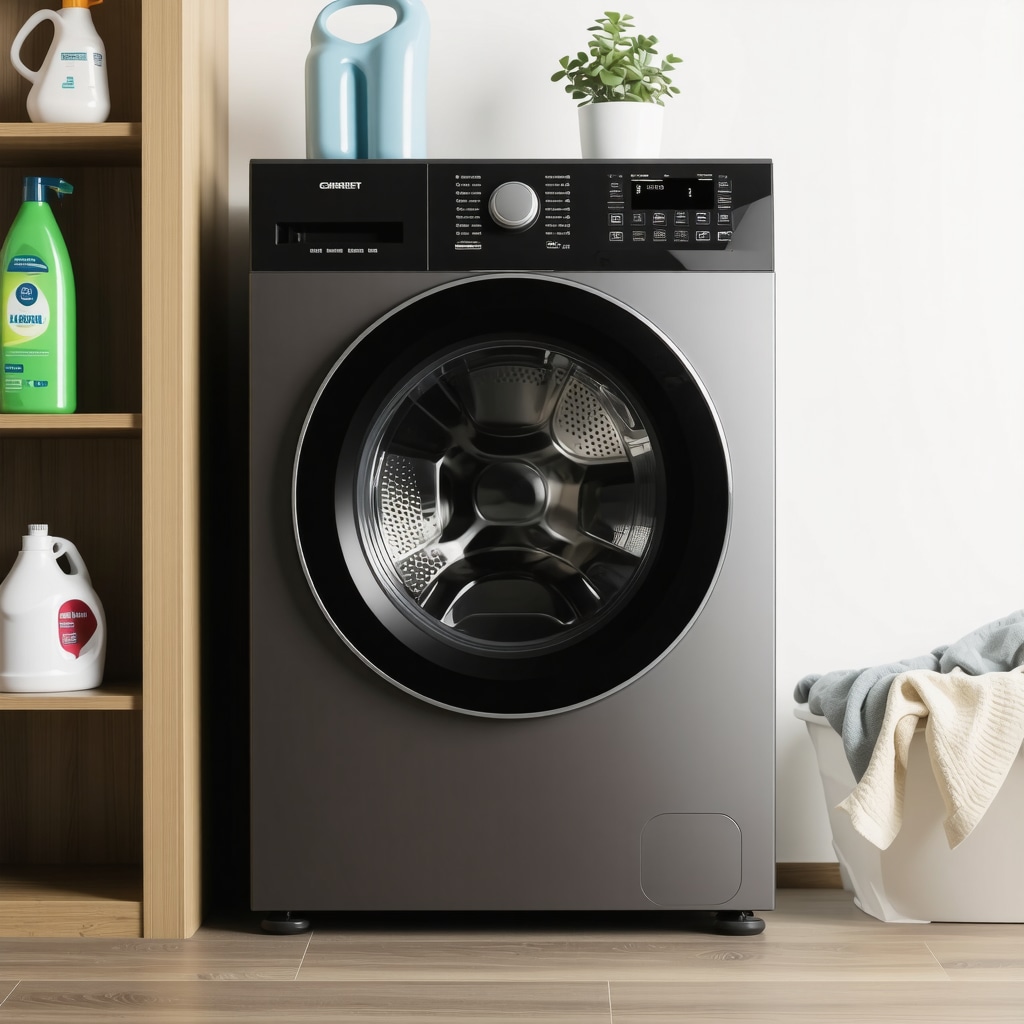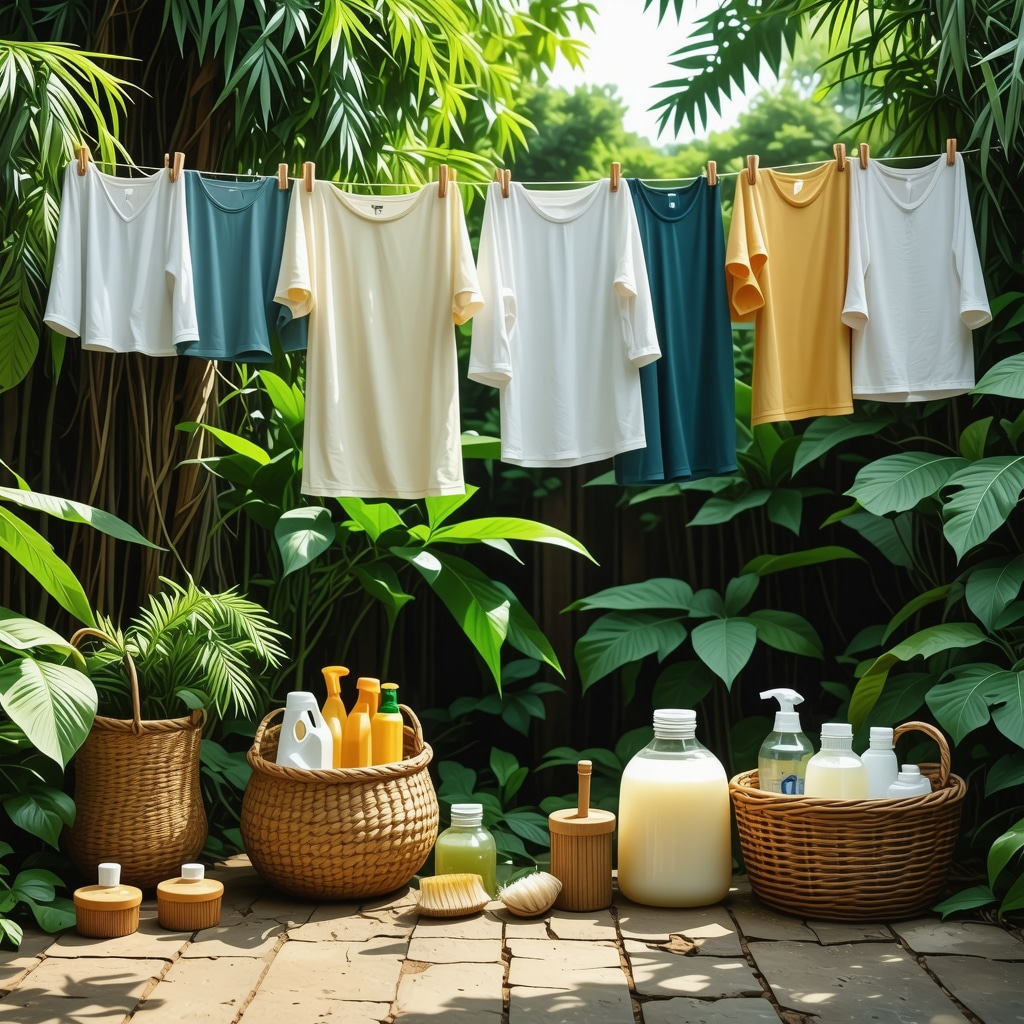Integrating Plastic-Free Principles into Sustainable Laundry Practices in Tampa
Transitioning to plastic-free garment care embodies a critical frontier in sustainable lifestyle adaptation, particularly in urban hubs like Tampa, FL. This approach not only reduces microplastic pollution—a significant contributor to aquatic ecosystem degradation as highlighted by scientific research published in Nature—but also aligns with the growing demand for eco-conscious consumer solutions. Embracing plastic-free laundry methods in Tampa involves a multi-layered strategy encompassing product selection, process optimization, and community engagement, thereby amplifying both environmental and social benefits.
Advanced Techniques for Minimizing Plastic Use in Laundry Routines
Why Opt for Plastic-Free Detergents and How They Impact Fabric Longevity?
Plastic-free detergents, typically composed of naturally derived surfactants and enzymes, circumvent the pervasive use of microplastic-containing synthetics found in conventional cleansers. These eco-certified products not only mitigate synthetic fiber shedding during washing cycles but also preserve textile integrity by avoiding harsh chemical residues. Tampa residents benefit from incorporating such detergents to maintain garment quality while reducing environmental footprint, especially when paired with gentle washing cycles and cold water usage. For expert advice on sustainable garment care, consider exploring Sustainable Garment Care: Protecting Luxury Wardrobes.
Innovative Laundry Tools and Practices to Eliminate Plastic Contamination
Utilizing laundry bags designed to capture microfibers, such as the Guppyfriend bag, represents a cutting-edge intervention to prevent microplastic discharge into Tampa’s waterways. Moreover, adopting alternatives to single-use plastic components—like refillable detergent containers and biodegradable dryer sheets—demonstrates a commitment to circular economy principles. Integrating these tools into daily routines requires not only awareness but also access to local suppliers and services that prioritize eco-friendly garment care, as featured in resources like Eco Dry Cleaning Tampa FL: Sustainable Methods for Workwear Care.
What are the Challenges and Solutions for Scaling Plastic-Free Laundry Practices in Urban Environments?
Despite growing interest, barriers such as availability of plastic-free products, cost premiums, and consumer inertia persist. Addressing these requires concerted efforts from local businesses, policymakers, and community advocates to create supportive infrastructures. Tampa’s eco-conscious enterprises can lead by example, offering plastic-free laundry services and educational campaigns. Collaborative initiatives can foster wider adoption, contributing to Tampa’s reputation as a leader in sustainable urban living.
Expert Invitation: Engage with Tampa’s Sustainable Garment Care Community
Professionals and environmentally committed individuals in Tampa are encouraged to share insights and innovations in plastic-free garment care by visiting our contact page. Joining this dialogue enhances collective expertise and accelerates the transition toward truly sustainable laundry ecosystems.
Synergizing Community and Technology for a Plastic-Free Laundry Revolution
In Tampa, the movement toward plastic-free laundry is gaining momentum, yet its success hinges on integrating both community engagement and technological innovation. Advanced filtration systems in washing machines, designed to trap microfibers before they enter water systems, represent a promising frontier. Tampa households adopting these technologies can significantly reduce microfiber pollution at the source. Additionally, community-led programs promoting the usage of natural fiber garments and educating on proper care techniques amplify the impact of plastic-free detergents and tools. These joint efforts create a resilient ecosystem for sustainable fabric care, bolstering Tampa’s environmental leadership.
Economic and Environmental Implications of Plastic-Free Laundry Adoption
Transitioning to plastic-free laundry routines in urban centers like Tampa entails both upfront costs and long-term savings. While eco-friendly detergents and microfiber-catching devices may initially appear costlier, they contribute to reduced water contamination and decreased garment wear, extending the life of clothing investments. According to a comprehensive analysis by the U.S. Environmental Protection Agency, investments in reducing microplastic pollution can yield substantial health and ecosystem benefits, underscoring the value of such sustainable practices. For residents seeking refined garment care, exploring advanced eco-friendly cleaning methods is advisable through trusted services like Luxury Green Dry Cleaning Services in Tampa FL.
How Can Tampa Leverage Policy and Innovation to Overcome Plastic-Free Laundry Barriers?
Addressing the systemic challenges of plastic pollution in laundry requires a multifaceted approach. Policymakers must incentivize local businesses to supply affordable plastic-free products and endorse infrastructure upgrades such as microfiber filters in residential and commercial laundry systems. Concurrently, innovation in biodegradable detergents and recyclable packaging can reduce environmental burdens. Tampa’s leadership in adopting such policies and fostering public-private partnerships could serve as a model for other metropolitan areas striving for sustainable garment care.
Interactive Engagement: Share Your Plastic-Free Laundry Success Stories
We invite Tampa residents, sustainability advocates, and garment care experts to contribute their experiences and strategies for plastic-free laundry by commenting below or sharing this article with your network. Your insights can inspire and guide others on the journey toward environmentally responsible laundry practices. For those interested in deepening their knowledge of eco-conscious fabric care, we recommend visiting Non-Toxic Dry Cleaners: Choosing Healthier Options.
Harnessing Smart Washing Technologies to Eradicate Microplastic Pollution at the Source
One of the most promising breakthroughs in sustainable laundry lies in the integration of smart washing machines equipped with microfiber filtration systems. These advanced devices employ multi-stage filters that capture microfibers shed during wash cycles—often invisible to the naked eye yet detrimental to aquatic ecosystems. Tampa residents embracing these technologies can drastically reduce microfiber release, a key contributor to microplastic pollution in urban waterways as reported by the American Chemical Society Environmental Science & Technology journal. By retrofitting existing machines or investing in next-generation models, households contribute directly to cleaner water bodies and healthier marine biodiversity.
From Fiber to Fabric: Exploring Biodegradable Natural Materials to Revolutionize Textile Sustainability
While laundering practices are critical, the textile composition itself plays a pivotal role in plastic pollution. The emergence of biodegradable natural fibers such as hemp, organic cotton, and bamboo presents a transformative approach to minimizing synthetic microfibers. These fibers not only degrade more readily in natural environments but also require less intensive chemical processing, thus reducing the overall ecological footprint. Tampa’s textile suppliers and fashion designers are increasingly integrating these materials, fostering a circular economy that prioritizes both style and sustainability. However, optimizing laundering methods for these fibers—such as lower temperature washes and gentle agitation—ensures longevity and reduces premature fiber loss.
What Role Can Public Policy Play in Accelerating Adoption of Plastic-Free Laundry Technologies in Tampa?
Public policy is a cornerstone in scaling environmentally responsible laundry practices citywide. Tampa’s municipal government can incentivize the adoption of microfiber filters through subsidies or tax credits, making these technologies financially accessible to a broader demographic. Additionally, regulations mandating eco-labeling on detergents and wash products can enhance consumer awareness and choice. Collaborative efforts between policymakers, environmental scientists, and industry stakeholders are essential to establish standards that balance innovation with feasibility. For example, frameworks similar to the European Union’s Microplastic Pollution Directive provide a blueprint for localized regulatory action.
Community-Driven Innovation Hubs: Catalysts for Tampa’s Plastic-Free Laundry Evolution
Beyond technology and policy, grassroots innovation hubs serve as incubators for community-driven sustainable laundry solutions. Tampa’s eco-innovation centers facilitate workshops, pilot programs, and knowledge exchanges that empower residents to experiment with plastic-free detergents, natural fabric care, and zero-waste practices. These hubs also host collaborations with academic institutions conducting microfiber pollution research, thereby bridging scientific insights with practical applications. Engaging directly with these centers offers Tampa’s citizens tangible pathways to contribute to and benefit from evolving garment care paradigms.
For laundry enthusiasts and sustainability advocates eager to pioneer these cutting-edge practices, connecting with local experts can amplify impact and refine techniques. We encourage readers to explore partnerships and resources at our Tampa Sustainable Laundry Initiative and participate in upcoming community events focused on plastic-free textile care.

Leveraging AI and IoT for Precision in Plastic-Free Laundry Optimization
The integration of Artificial Intelligence (AI) and the Internet of Things (IoT) within laundry systems presents a sophisticated avenue to tailor washing cycles optimally, thereby minimizing microfiber shedding and plastic pollution. Smart sensors embedded in washing machines can monitor fabric types, soil levels, and water hardness, dynamically adjusting parameters to preserve garment integrity while reducing environmental impact. Tampa’s progressive adoption of these technologies exemplifies how data-driven insights enable consumers to engage in plastic-free laundry with enhanced efficacy and convenience, marking a paradigm shift towards intelligent sustainable fabric care.
Material Science Innovations: Engineering Next-Generation Biodegradable Fibers and Detergents
Recent breakthroughs in polymer science have facilitated the development of biodegradable synthetic fibers that mimic the performance characteristics of conventional plastics but decompose rapidly under environmental conditions. Concurrently, enzymatic detergents engineered through synthetic biology pathways optimize stain removal while minimizing chemical residues and microplastic formation. Tampa-based textile innovators and chemical engineers collaborate closely to pilot these materials, fostering a local ecosystem of sustainable textile production and laundering that could redefine industry standards globally.
How Can Tampa’s Stakeholders Integrate Circular Economy Principles to Fully Eliminate Plastic Waste in Laundry?
Implementing a circular economy approach in Tampa’s laundry sector involves rethinking resource flows from fiber sourcing through garment end-of-life management. Stakeholders must establish closed-loop systems where biodegradable textiles are composted or recycled, plastic-free detergents use refillable packaging, and wastewater treatment facilities incorporate microfiber capture technologies. Strategic partnerships among manufacturers, municipal authorities, and consumers are essential to create infrastructure that supports these cycles. The Ellen MacArthur Foundation’s extensive research on circular textiles (ellenmacarthurfoundation.org) provides actionable frameworks Tampa can adapt to accelerate this transition.
Policy Instrumentation: Incentivizing Innovation and Consumer Adoption Through Targeted Regulation
Beyond subsidies and tax incentives, Tampa policymakers can deploy innovative regulatory instruments such as tradable microfiber emission permits and mandatory product eco-labeling with QR codes linking to lifecycle data. These mechanisms create transparency and economic motivation, driving manufacturers and consumers toward plastic-free alternatives. Furthermore, establishing stringent effluent standards for laundering facilities compels industry compliance with microfiber reduction targets. Engaging with interdisciplinary experts and referencing global best practices, including the EU’s comprehensive directives on microplastic pollution, ensures Tampa’s policy frameworks are robust and forward-looking.
Expanding Public Engagement: Harnessing Behavioral Economics to Promote Sustainable Laundry Habits
Understanding the psychological drivers behind consumer choices enables the design of incentive programs and educational campaigns that effectively shift behavior towards plastic-free laundry practices. Nudges such as social norm messaging, reward systems for sustainable purchases, and gamified community challenges enhance participation and retention. Tampa’s municipal sustainability office can collaborate with social scientists to deploy pilot studies, refining engagement tactics to maximize environmental outcomes and community cohesion.
Fostering Collaborative Research and Development Networks in Tampa’s Eco-Innovation Ecosystem
Establishing multi-stakeholder R&D consortia that include universities, startups, manufacturing firms, and environmental NGOs promotes cross-pollination of ideas and accelerates technology transfer. These networks can focus on developing scalable microfiber capture solutions, next-gen detergents, and biodegradable fiber cultivation techniques tailored to Tampa’s climatic and economic context. Funding mechanisms such as innovation grants and public-private partnerships catalyze these initiatives, positioning Tampa as a hub of sustainable textile and laundry research.
Embrace these advanced insights and contribute to Tampa’s pioneering plastic-free laundry revolution by connecting with local experts and innovation hubs via our Tampa Sustainable Laundry Initiative. Together, we can architect a future where textile care harmonizes with ecological stewardship.

Expert Insights & Advanced Considerations
Integrating Smart Technologies to Optimize Microfiber Capture
The deployment of AI-enabled washing machines with IoT connectivity offers Tampa households unprecedented control over laundering processes, dynamically adjusting wash parameters to minimize microfiber release. This intelligent approach not only preserves garment longevity but also advances environmental stewardship by preventing microplastic pollution at its source.
Material Innovation as a Cornerstone for Sustainable Textile Care
Biodegradable synthetic fibers and natural materials such as hemp and bamboo are reshaping textile sustainability paradigms. Their adoption in Tampa’s garment industry, coupled with eco-conscious laundering techniques, creates a synergistic effect that reduces ecological footprints and supports circular economy principles.
Policy and Community Synergy to Overcome Adoption Barriers
Effective scaling of plastic-free laundry practices requires cohesive action between policymakers, local businesses, and community innovation hubs. Incentives for microfiber filter installations, eco-labeling mandates, and grassroots education programs in Tampa form a multi-pronged strategy to foster widespread behavioral change and technological uptake.
Behavioral Economics as a Catalyst for Sustainable Habits
Applying principles of behavioral economics—such as social norm nudges and reward-based engagement—can significantly accelerate the adoption of plastic-free laundry routines. Tampa’s sustainability initiatives that harness these tactics demonstrate increased community participation and long-term commitment to eco-friendly garment care.
Collaborative R&D Networks Driving Local Innovation
Multi-stakeholder research consortia involving Tampa’s universities, startups, and environmental organizations are pivotal in developing scalable microfiber capture technologies and enzymatic detergents. These collaborations ensure that innovations are tailored to local needs, fostering a resilient ecosystem of sustainable garment care.
Curated Expert Resources
- Ellen MacArthur Foundation – Circular Textiles Framework: Provides comprehensive research and actionable models for implementing a circular economy in textile production and laundering, essential for Tampa’s strategic planning.
- American Chemical Society Environmental Science & Technology Journal: Offers peer-reviewed studies on microfiber pollution and advanced filtration technologies, informing evidence-based practices in sustainable laundry.
- U.S. Environmental Protection Agency Water Topics: Supplies authoritative data on water contamination from microplastics and guidelines for mitigation, pivotal for policy formulation in Tampa.
- Sustainable Garment Care: Protecting Luxury Wardrobes: A specialized resource detailing best practices in eco-friendly garment maintenance tailored for high-end fabrics.
- Luxury Green Dry Cleaning Services in Tampa FL: Local expertise showcasing state-of-the-art eco-cleaning methods that align with plastic-free laundry goals.
Final Expert Perspective
The journey toward plastic-free laundry in Tampa transcends mere product substitution; it embodies a holistic transformation integrating advanced technology, innovative materials, progressive policy, and community engagement. By embracing smart washing systems, biodegradable fibers, and evidence-based behavioral strategies, Tampa can pioneer sustainable garment care that harmonizes environmental integrity with consumer needs. We invite industry leaders, policymakers, and eco-conscious residents to deepen their engagement through expert collaboration and resource exchange. Explore detailed methodologies and connect with local specialists at our Tampa Sustainable Laundry Initiative to collectively forge a future where fabric care is synonymous with ecological responsibility.


I’ve been trying to transition my laundry routine to a plastic-free model here in Tampa, and this post captures so much of what that shift entails. What stands out to me is the balance between adopting advanced tech, like microfiber filters in washing machines, and maintaining simple behavioral changes like choosing cold water cycles and plastic-free detergents. The challenge for me has been finding reliable sources locally for these eco-friendly detergents and microfiber-catching laundry bags. While upfront costs can be intimidating, I’ve noticed my clothes do seem to last longer, which makes the investment feel worth it. I’m also curious about how community innovation hubs mentioned here operate in practice—do they offer practical workshops, product swaps, or support networks? I think such grassroots efforts could tip the scale by making sustainable laundry more accessible. For others who’ve embraced this in Tampa or similar urban areas, how have you navigated availability and cost barriers? Also, how have you engaged with local policy or community groups to promote wider adoption of these practices? It seems like the mix of personal action and systemic support is crucial for driving real change.